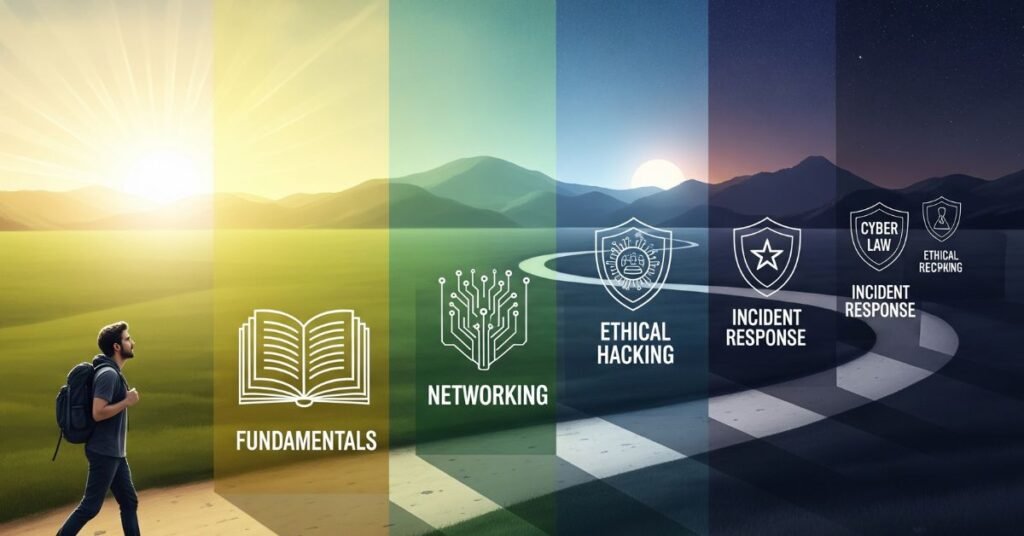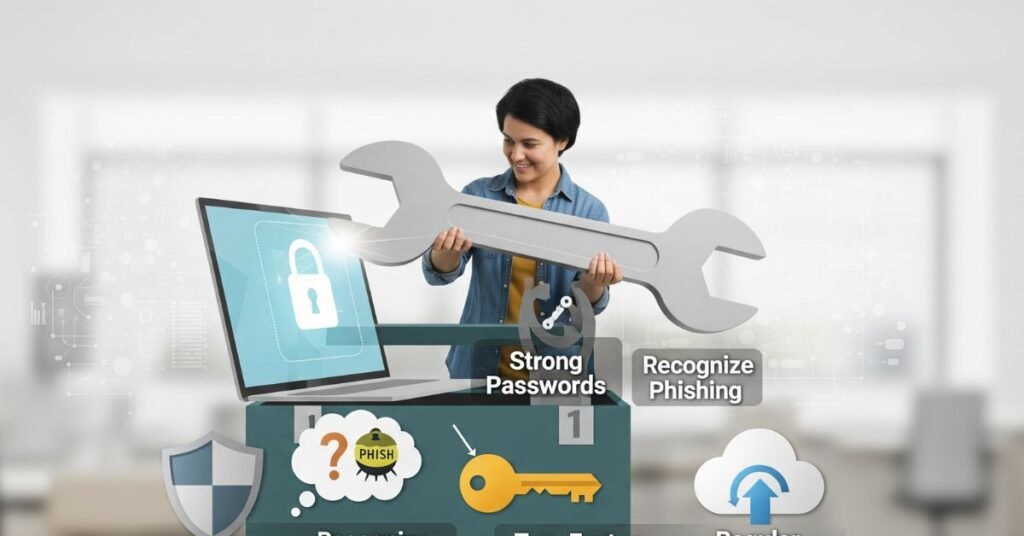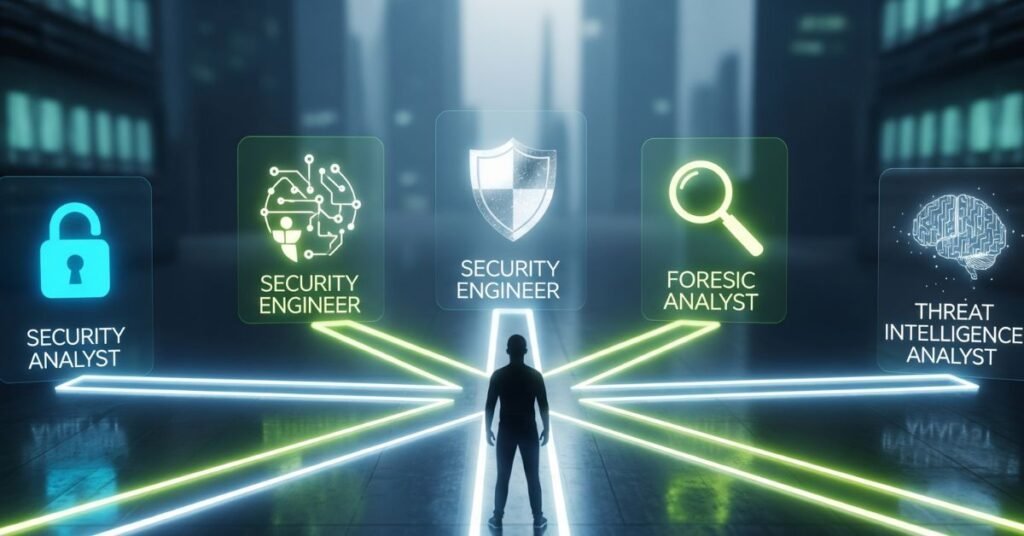Is Cyber Security Difficult to Learn? Many people who want to get into the online safety and security arena have been asking the above question. Nowadays, cyber attacks have been increasing, and businesses seek individuals who will be able to safeguard their information. Of course, learning cyber security may sound challenging with all the technical terms and the rapid advancement of the subject, but it isn’t that intimidating after all.
With the appropriate resources, some quality advice, and some practice, anyone can learn the subject. In the article ahead, we will discuss just how difficult cyber security is, the ease it presents, the skills that you need to possess, and the awesome career opportunities that come once you become an expert of the subject.
What Cyber Security Actually Is

Cyber security is the practice of protecting networks, devices, and data from attacks. It is not only about hacking systems but also about preventing threats, managing risks, and ensuring digital safety. Many people think cyber security is only for experts, but that is not true. It is a broad field with different levels of learning.
There are many areas under cyber security such as network defense, ethical hacking, cloud security, and incident response. For example, one person may work on stopping phishing attacks while another may investigate crimes after a system is hacked. This shows that cyber security is not one single skill but a collection of different skills working together.
You will like this: What is an Online Database
Why People Think Cyber Security Is Hard

Many people believe cyber security is hard because of the technical language used. Terms like “penetration testing” or “intrusion detection” can sound scary to beginners. Another reason is that cyber threats change quickly. A system that is safe today may be unsafe tomorrow. This makes people think they must always run to catch up.
Another strong reason is the Hollywood image of hackers. Movies show cyber experts typing fast on screens filled with codes. This gives the idea that cyber security is only for geniuses. But in reality, it is more about patience, problem-solving, and continuous practice than about being super smart.
Skills You Really Need to Learn Cyber Security

Cyber security does need certain skills. The first skill is understanding basic networking because networks are the backbone of the internet. Knowing how computers talk to each other makes it easier to secure them. Another needed skill is understanding operating systems like Linux and Windows. These are the places where attacks often happen.
Apart from technical skills, soft skills are equally important. Problem-solving is one of them. You must be able to think fast when an attack happens. Communication is also important because cyber experts often explain issues to people who do not have a technical background. The mix of technical and soft skills makes a person ready for cyber security roles.
What Actually Makes Cyber Security Easier to Learn

Cyber security looks hard until you see the number of resources available. There are online courses, boot camps, and free labs that make it easier. For instance, websites like HackTheBox and TryHackMe allow learners to practice real attacks in a safe space. This turns learning into a fun activity instead of a boring book exercise.
Certifications also help beginners. For example, CompTIA Security+ is often called the “entry door” to cyber security. It gives a clear start and helps learners build confidence. Another factor that makes cyber security easier is community support. Online forums, Reddit groups, and local meetups are filled with people sharing solutions and advice.
Read more: How Does Technology Help Students Learn Financial Literacy With Graphs
Common Challenges While Learning Cyber Security

The first challenge is confusion. Cyber security has many paths and beginners often do not know where to start. Should they study ethical hacking first or go for cloud security? This lack of direction slows down learning. Another challenge is the constant updates. New threats appear daily, and staying updated can be tiring.
Balancing theory with practice is also a challenge. Some learners spend too much time reading books while others only try hacking without theory. Both approaches fail. The right way is a balance between both. Finally, many learners struggle because they do not have a mentor. Without guidance, mistakes become repeated and progress slows.
How Long Does It Take to Learn Cyber Security?

The time needed to learn cyber security depends on effort and background. A beginner with no technical knowledge may take three to six months to learn the basics. This includes understanding networks, simple attacks, and basic defense methods. With regular daily study, you can gain strong basics in less than a year.
For job-ready skills, the timeline is usually six to twelve months. This depends on how much time you give each day. Specializations like penetration testing, forensics, or cloud security can take years because they need mastery. But remember, cyber security is not something you learn once and stop. It is a field that requires lifelong learning.
Learning Timeline in Cyber Security
| Learning Stage | Timeframe | Key Focus |
| Basic Literacy | 3–6 months | Networking, OS basics, simple threats |
| Job-Ready Skills | 6–12 months | Certifications, hands-on practice |
| Specialization | 2–3 years | Advanced tools, niche skills |
| Lifelong Learning | Continuous | Staying updated with new threats |
Practical Tips to Make Learning Cyber Security Easier

The first tip is to begin with the basics of networking and operating systems. Without these, advanced hacking will feel impossible. Structured learning paths are better than random tutorials because they give direction. For example, following CompTIA certifications step by step builds knowledge smoothly.
Practice is the real key. Daily practice in virtual labs sharpens your skills. Communities also help because you can ask questions and get answers fast. Another smart tip is to write about what you learn. Teaching others or keeping a blog helps you remember better and keeps you motivated.
Tools That Help Beginners in Cyber Security
| Tool/Platform | Purpose | Cost |
| Wireshark | Network analysis | Free |
| Kali Linux | Penetration testing OS | Free |
| TryHackMe | Beginner-friendly practice labs | Free/Paid |
| HackTheBox | Advanced hacking challenges | Free/Paid |
| CompTIA Security+ | Entry-level certification | Paid |
Career Paths and Opportunities in Cyber Security

Cyber security offers many job options. Entry-level jobs include SOC analyst, junior penetration tester, and IT security support. These jobs are stepping stones where you gain real-world experience. They may not pay very high in the beginning, but they open doors to better roles.
As you grow, you can move to roles like cyber security consultant, security engineer, or incident responder. Later, experts can become Chief Information Security Officers (CISO) or forensic investigators. The salaries are also rewarding. According to many reports, cyber security jobs pay more than average IT jobs because of high demand.
Cyber Security Career Paths
| Career Level | Example Roles | Average Salary (US) |
| Entry-Level | SOC Analyst, Junior Pen Tester | $55,000 – $70,000 |
| Mid-Level | Security Engineer, Incident Responder | $80,000 – $110,000 |
| Senior-Level | Cyber Security Consultant, Forensics | $120,000 – $160,000 |
| Executive | CISO, Cloud Security Architect | $170,000 – $250,000+ |
Real-Life Examples of People Who Learned Cyber Security

One inspiring story is about a young woman named Sarah, who worked as a school teacher before entering cyber security. She had no IT background, but after seeing news about rising online scams, she became curious. She started with free resources like YouTube tutorials and networking basics, then joined a part-time boot camp. that even people from non-technical fields can succeed in cyber security with persistence and structured learning.
Another example is James, a former retail worker who always had an interest in computers but never studied them formally. He began practicing on platforms like HackTheBox and TryHackMe, spending evenings solving small challenges. Over time, his skills improved, and he built a portfolio of projects
FAQ’’S
Do I need to know coding to learn cyber security?
No, you don’t need coding to start. Basic coding helps later, but many entry-level roles focus on networking and system defense first.
Can a beginner with no IT background learn cyber security?
Yes, many people from non-technical backgrounds enter cyber security. It takes more time, but with structured learning paths, it is possible.
Is cyber security a stressful job?
Sometimes, yes. Handling attacks in real time can be stressful, but it also gives excitement and purpose. Many experts find the work rewarding.
How much can I earn after learning cyber security?
Salaries vary by role, but most cyber security jobs pay higher than average IT jobs. Entry-level jobs start around $55,000 in the US.
What is the fastest way to learn cyber security?
The fastest way is to mix theory with practice. Start with networking basics, take an entry certification like CompTIA Security+, and practice daily in labs.
Conclusion
Is Cyber Security Hard to Learn? It is not as hard as many people think. The field looks complex because of technical words and rapid updates, but learning step by step makes it simple. Anyone with dedication, patience, and curiosity can succeed in cyber security. The journey may take time, but the rewards are worth it. From high salaries to job security and the thrill of fighting hackers, cyber security is a career that gives both challenge and satisfaction.




